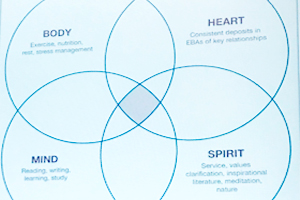 by Becky Tankersley, MEd, Communications Manager, Strategy and Enrollment Planning, Georgia Institute of Technology
by Becky Tankersley, MEd, Communications Manager, Strategy and Enrollment Planning, Georgia Institute of Technology
In a busy world that seems to keep getting busier, the question remains: how does one appropriately balance work with the rest of life?
In a follow up to his previous session, “
Seven Habits of Highly Effective Administrators,” presenter Texas Ruegg of LeTourneau University emphasized the importance of balancing life and work in his session “Balancing Work, Life, and Volunteerism.”
Based upon Stephen Covey’s leadership classic
The Seven Habits of Highly Effective People, Ruegg focused this session on prioritizing self-care. Ruegg used his own experience to illustrate the importance of this lesson. He experienced personal tragedy when his son was born prematurely, and his wife passed away shortly thereafter from cancer. Up until that time, he spent much of his time at work, focused on doing his best for the company. After experiencing this traumatic loss, he saw the importance of prioritizing self-care and putting family first, and now seeks to share his story with others.

In this image, adapted from Covey’s book for this presentation, Ruegg places focus on four key areas of wellness: body, heart, mind, and spirit. Ruegg encouraged the audience to identify activities in each of these areas that contributes to their overall wellness and happiness. He then offered the audience the following tips on how to turn these into goals, and successfully achieve them:
Write it down. Write down one thing you can start doing, stop doing, or continue doing, that contributes to your self-care in four areas: body, heart, mind, spirit. People who write down goals are 20 percent more likely to achieve them.
Put it on your schedule. Set aside time on your schedule each day (or week, depending upon the task) to do each of these things. You are 80 percent more likely to achieve goals if they are planned into your schedule.
Prepare for obstacles. Obstacles will come! Whether it’s in the form of work obligations, your own scheduling, or life in general, things will come between you and your self-care. Prepare for these situations and with practice, it will become easier to stay committed to your goals.
Work is important for all of us, but Ruegg reminded the audience that should a tragedy happen, your employer will keep moving forward. Your family and friends, however, cannot replace YOU. Find alignment in your life of what’s most important, and be honest with your supervisor about your responsibilities and priorities, both in and out of work. This creates a dialog of understanding for all parties involved.
During the audience participation portion of the session, audience members offered tips on how they achieve work-life balance. Many supervisors suggested that in order to truly help your employees believe they can have work-life balance, it’s vital to display it in your own life. For example, if you do not want employees to respond to emails on the weekend, then do not send emails to them on the weekend. Lead by example by setting your boundaries and committing to them. By demonstrating proper self-care and balance, your employees will do the same, ultimately leading to a happier, more balanced, and more fulfilled staff, who in turn create happier, more satisfied customers.